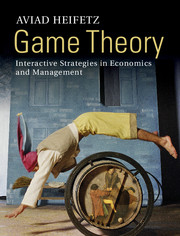Book contents
- Frontmatter
- Contents
- Foreword
- Part I Strategic interactions as games
- Part II Basic solution concepts for strategic form games
- Part III Prominent classes of strategic form games
- Part IV Uncertainty and mixed strategies
- Part V Advanced topics in strategic form games
- Part VI Dynamic games
- Part VII Repeated games
- Index
Part VII - Repeated games
Published online by Cambridge University Press: 05 August 2012
- Frontmatter
- Contents
- Foreword
- Part I Strategic interactions as games
- Part II Basic solution concepts for strategic form games
- Part III Prominent classes of strategic form games
- Part IV Uncertainty and mixed strategies
- Part V Advanced topics in strategic form games
- Part VI Dynamic games
- Part VII Repeated games
- Index
Summary
INTRODUCTION
A repeated game is an extensive form game with an infinite horizon, in which the same normal form game is played again and again indefinitely. While the game repeats itself irrespective of the history of play, the players’ strategies may very well depend on the history of play. Along each infinite history of repetitions of the game, the payoff to each player is the discounted sum of her stage payoffs, with some discount factor between 0 and 1. The discounting is interpreted as either (1) the extent to which players prefer current payments over future ones, or (2) the probability that the game will not be halted but will actually continue into the future, or (3) as resulting from a monetary interest rate applying to saving of accumulated payments or to loans on account of future payments.
In Chapter 23 we study the infinitely repeated Prisoner’s Dilemma. Despite the fact that defection is a dominant strategy in the one-shot game, we show that the infinitely repeated Prisoner’s Dilemma has subgame perfect equilibrium strategies in which the players cooperate in all or at least some of the rounds. Such equilibrium strategies call the players to cooperate, and involve a threat of a “punishment phase” of defection for several rounds by the player who suffered from the initial unexpected defection if and when unexpected defection has indeed occurred. At equilibrium, the punishment phase is long enough so as to foreshadow the short-term gains that the defector could potentially achieve by surprising his opponent, and hence no unexpected defection actually occurs on the equilibrium path. The higher the discount rate, the shorter the punishment phase (from which the punisher might suffer as well) needed to induce the equilibrium cooperation.
- Type
- Chapter
- Information
- Game TheoryInteractive Strategies in Economics and Management, pp. 383 - 384Publisher: Cambridge University PressPrint publication year: 2012



